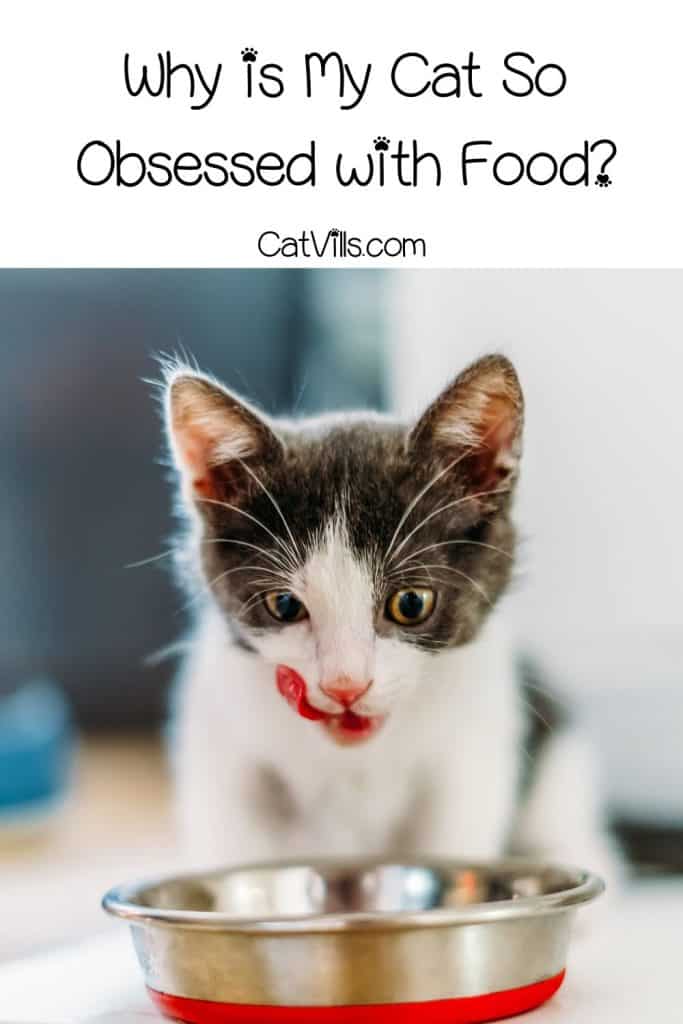Last Updated: 1 year ago
Are you wondering, “Why is my cat obsessed with food?”
It’s natural to be worried about your feline’s behavior, especially if your cat is going crazy for non-food items.
So, we’re going to talk about everything you need to know about food obsession in cats and how to manage it.
8 Signs Your Cat Is Obsessed with Food
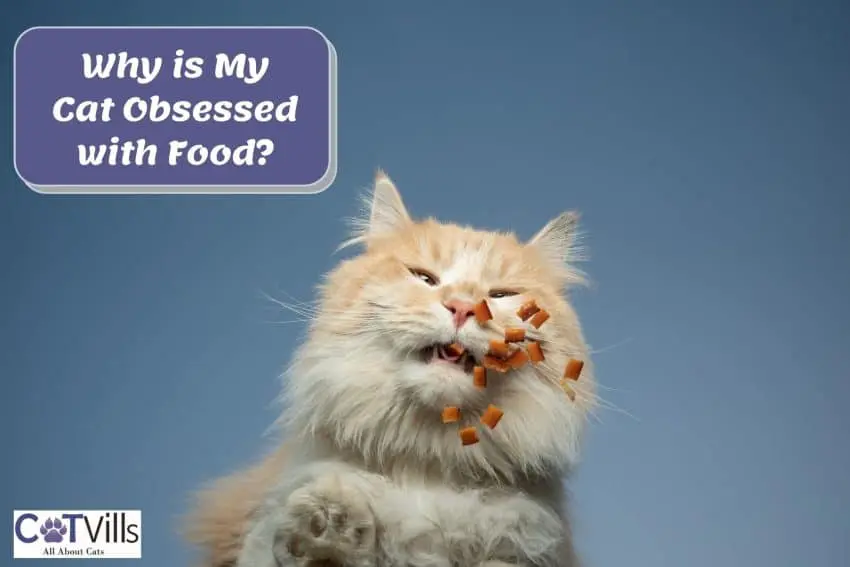
All cats are a little bit crazy for food and ready to sprint to the kitchen when they hear the can opener or the fridge.
That’s why it’s not always easy to spot that a cat has an eating disorder. So, let’s talk about the most common signs of abnormal feeding behavior in cats.
1. Impatience
Is your cat rubbing all over your legs when you’re preparing their meal and won’t leave you in peace? Or tries to grab the food from your hands, not caring if it hurts you?
Then your kitty is either on the brink of starvation or has a problem.
Some cats get impatient when you take too long to prepare their dish, but extreme impatience isn’t normal, especially if it’s a new behavior.
2. Over-Excitement
Most cats are excited when it’s mealtime, and we can’t blame them. After all, we all like tasty dishes.
But it’s concerning if your kitty is overly excited about food and always gets in your way. Such behavior is one of the signs your cat is food-obsessed.
3. Food-Related Aggression
Does your cat grow or hiss when you or another pet is near their bowl of food?
There’s nothing wrong with your cat protecting its bowl, but extreme aggression during mealtimes is a likely sign of obsession. And it can escalate if you have multiple cats.
4. Ravenous Appetite
A cat with a problem will constantly search for something to eat, even after eating everything in its bowl.
For example, an obsessed cat will go through the garbage, eat any leftover crumbs it can find on the floor, and try to get into cupboards and fridges.
These cats are also likely to exhibit pica behavior, eating non-food items such as strings, ribbons, and so on.
5. Panic Attacks
Some owners report that their food-obsessed cats have something similar to panic attacks before and after meals.
Likely, food-obsessed cats are worried about not getting fed in time or scared of starving when there’s no more kibble in their bowls.
6. Changes in Vocalization
It’s normal for cats to yowl when they’re hungry.
However, if your kitty continues to cry even after you’ve fed it, your feline friend has a problem, or you’re not feeding it enough.
7. Bad Behavior at Meals
If you have to keep your cat in another room when you’re eating because it keeps stealing from your plate, it can be an obsession.
Constant pestering for food is problematic, especially if you feed your cat a proper high-protein diet and provide regular meals.
8. Eating Fast
Have you ever seen your cat gulf down their meal and then vomit it after a few minutes? Specialists call this regurgitation, and it happens because the cat eats too fast.
It’s common for stray cats to have to fight with other animals for scraps. But it can also point to an obsession developed due to the traumatic experience of living outside.
Common Reasons Why is My Cat Obsessed With Food?
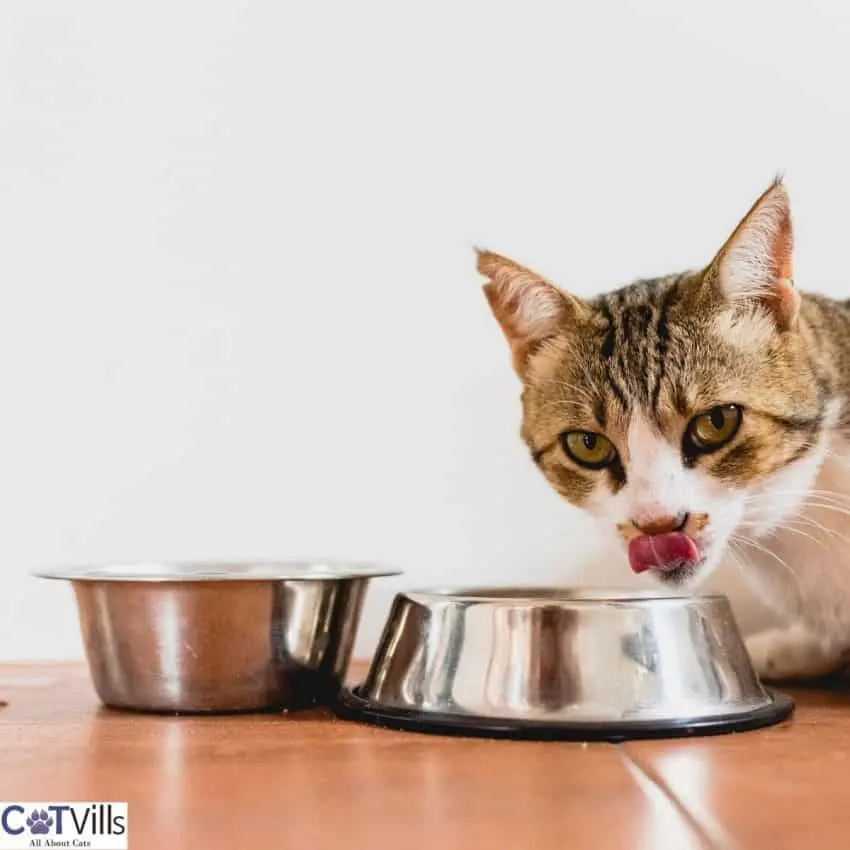
So, you know that your cat turning into a scary monster at mealtime isn’t normal.
But the question is, “Why is your cat obsessed with food? Cats are obsessed with food due to a physical or psychological condition, such as:
- Illness: While most owners are worried about lack of appetite, increased appetite is also a sign of sickness, pointing to an underlying medical condition, like hyperthyroidism.
- Stress: Just like people, some cats eat more when they’re stressed and find comfort in munching on something. Check these other signs of a stressed cat.
- Depression/Boredom: If your cat lacks enough mental and physical stimulation, it can get depressed and obsessed with eating.
- Psychogenic abnormal feeding behavior: As a study concluded, a psychological issue is a possible cause of a ravenous appetite in cats.
- Improper Diet: According to dr. Karen Becker, “cats and dogs exhibit odd behaviors when they were not being provided the nutrients their bodies needed.”
As such, you should take your cat to the vet and have them run full blood work to determine if your kitty is healthy and not underweight /overweight.
Why Does My Cat Act Like He’s Starving?
You’re feeding your cat well, but they continue to meow for food. So, you start thinking, “Why does my cat act like he’s starving?” Is he obsessed?
Many cats with an obsession will act like they’re starving. However, such behavior has other possible reasons which you should consider.
1. Your Cat Is Pretending
Some cats pretend they’re hungry to attract your attention. That’s why they walk away from the bowl after you fill it with kibbles.
Some of my cats do the same when I’m too busy to pet them, and it’s an effective strategy because you start worrying about your cat being sick.
2. Food Is Stale
If your cat still has plenty of kibble in the bowl, but it’s yowling for more, the problem can be that the cat food is too stale.
Some cats have high standards when it comes to the content of their bowls and won’t touch anything that’s not fresh enough for their taste.
3. Bowl Is Wrong
Cats don’t like to get their whiskers dirty or wet, which can be a problem if you’re feeding them in a deep bowl.
Moreover, the wrong bowl can cause whisker fatigue, which can make your cat yowl in front of its dish and act like they’re starving.
Why Is My Cat Always Begging For Food?
All cats beg for food, especially when they see you holding something delicious in your hand. But constant hunger and begging can point to an underlying medical condition.
For example, if your cat is hungry all the time and loses weight, you can be dealing with diabetes, hyperthyroidism, cancer, or intestinal parasites.
But, constant begging can also be related to the type of food you’re feeding your cats. Low-quality brands don’t have the necessary amount of protein and nutrients to sate your cat’s hunger.
As a result, the cat gets hungry again after a short period of time and starts begging for another portion. I’ve noticed the same behavior in my cats whenever I switch to a lower-quality brand.
A Reddit user also explains, “Many former strays have food issues.” That’s because these cats had to go hungry for days and fight with other cats for scraps.
So, formal feral and rescue cats often worry about when and if food will be available again. That’s why they beg or get a little bit obsessed with eating.
Should I Be Concerned If My Cat Is Obsessed with Food?
I will be concerned if my cat is obsessed with food. It’s not healthy for cats to steal scraps from the table, overeat, or experience food-related anxiety.
You can’t always keep everything under lock and key, so your cat doesn’t steal something toxic they shouldn’t eat and get very sick.
Overeating also leads to weight gain. That’s not good for cats at all because it puts them at risk of developing diabetes and other joint problems.
More importantly, this obsession can be the first symptom of an underlying condition, especially if your cat eats and drinks more than usual.
And the problem can become more serious if you don’t take steps to help your kitty overcome their obsession—more about how to do it in a bit.
10 Tips on How to Stop a cat from Overeating
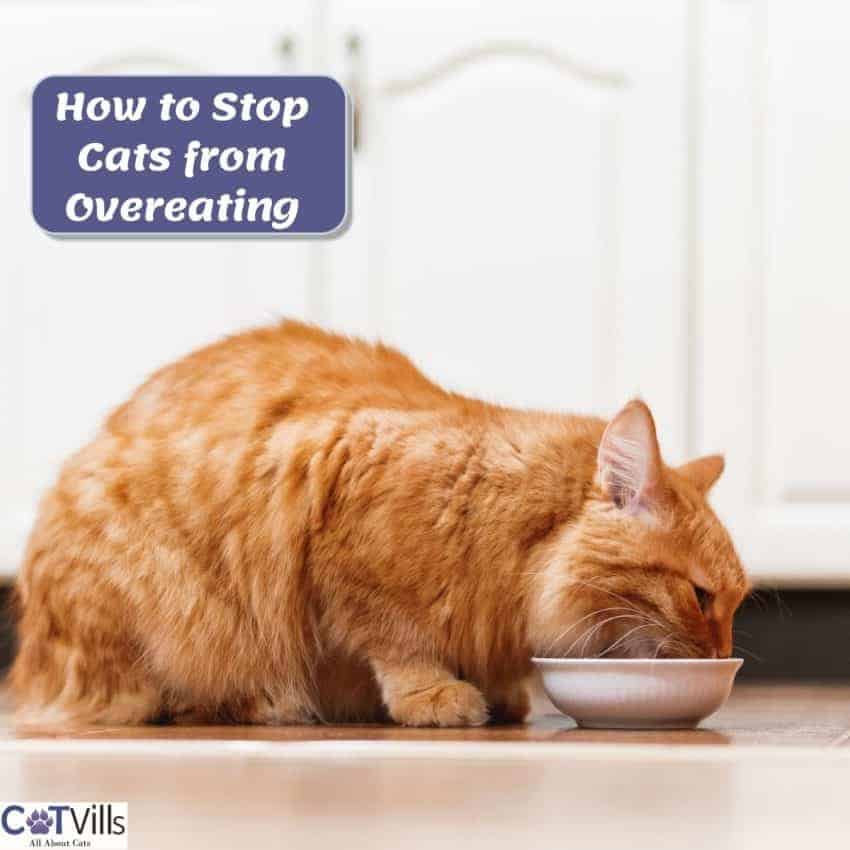
It’s exhausting if you have to keep an eye on your cat all the time to prevent them from getting into your meals or eating something dangerous. And even a couple of extra pounds can be bad for your kitty.
So, what can you do if your cat is obsessed with food? Here are 10 tips on how to stop a cat from overeating or getting obsessed with its meal.
1. Rule a Medical Issue
To stop a cat from overeating, you should first ensure your kitty isn’t an obsessive eater due to health issues.
Ask the vet to run full blood work to check your kitty’s blood sugar and hormones. And do tests for intestinal parasites.
If you catch it in time, you can manage diabetes and hyperthyroidism in cats with a proper diet and medication. Parasites are also easy to cure with regular deworming.
2. Improve Diet
If you’re feeding your kitty a low-quality brand, switching to the best cat dry food can help with overeating and eating obsession.
As one Reddit user says, “I changed my cat’s food with a high protein and nutritional value than most cat food,” and the problem disappeared.”
You can also try feeding your cat a mixture of dry and wet food to increase the water intake and make your kitty feel full for longer.
3. Establish a Feeding Schedule
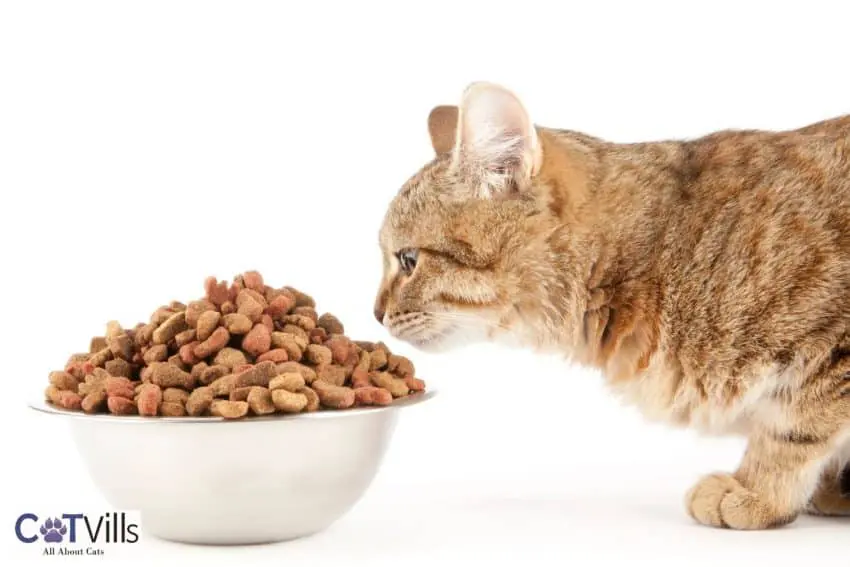
When you’ve got a cat with abnormal feeding behavior, it’s best to provide several small meals throughout the day.
A regular schedule can do wonders for a cat with food anxiety because your kitty won’t have to wonder when the next meal will be. And you can ensure your cat doesn’t overeat.
4. Don’t Leave Food Available
Some cats will eat until they’re sick. So, put the food bowl away once your cat has had it’s full, and don’t give in to your feline friend’s begging for an extra portion.
Don’t use automatic feeders because you won’t be able to monitor your cat’s food intake or stop them from overeating.
5. Make Eating a Challenge
Cats often overeat and get obsessed because they’re bored and their environment doesn’t provide the necessary stimulation.
Try combining activity with feeding. Hide kibble around the house, use cat treat dispensing toys to engage your cat’s brain, and play fetch with the treats.
Also, consider slow feeding bowls to ensure your cat doesn’t gulf their meal and prevent vomiting.
6. Spend Quality Time with Your Cat
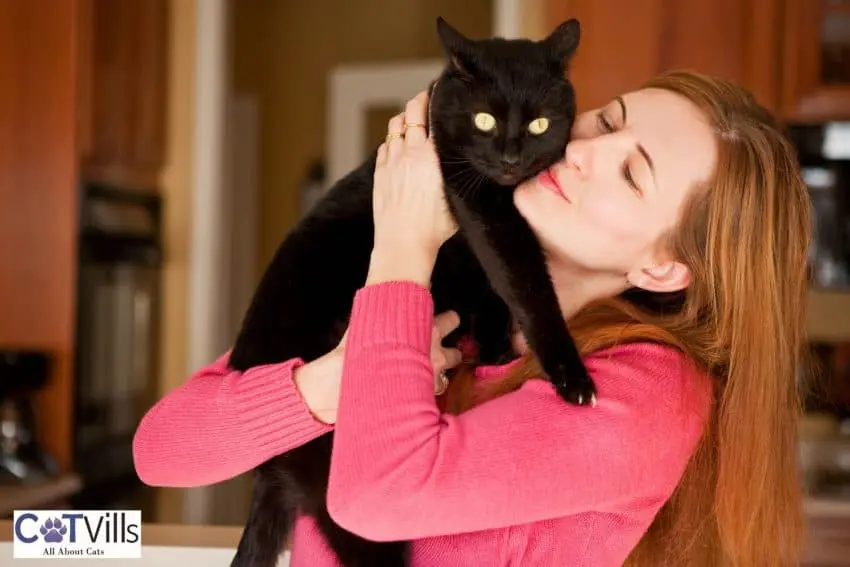
Sometimes cats become obsessive eaters because you’re not spending time with them. Crying and stealing human food is how your cat pleads for your attention or asks for help.
So, ensure you spend plenty of time petting and playing with your kitty to soothe their boredom and anxiety.
7. Ignore Unwanted Behavior
Cats quickly learn that crying makes you feed them tasty treats. So, don’t give to your cat’s begging because you’re reinforcing the behavior, and your cat will drive you crazy with their yowling.
If your cat is persistent and jumps on counters, tables, or people, you can remove the cat from the room until your kitty calms down.
8. Consult a Behavior
As I already mentioned, some cats are obsessed with eating because they have a mental disorder – psychogenic abnormal feeding behavior.
In this case, you should work with a professional cat behaviorist to determine what’s wrong with your kitty and how you can fix it.
9. Reduce Stress
Ít doesn’t take much to stress a cat, especially timid ones. And when cats are stressed, they can have an increased appetite.
So, think about if something is stressing your pet and work on removing the stressor. Once your cat is calm, they should start eating less.
10. Don’t Punish
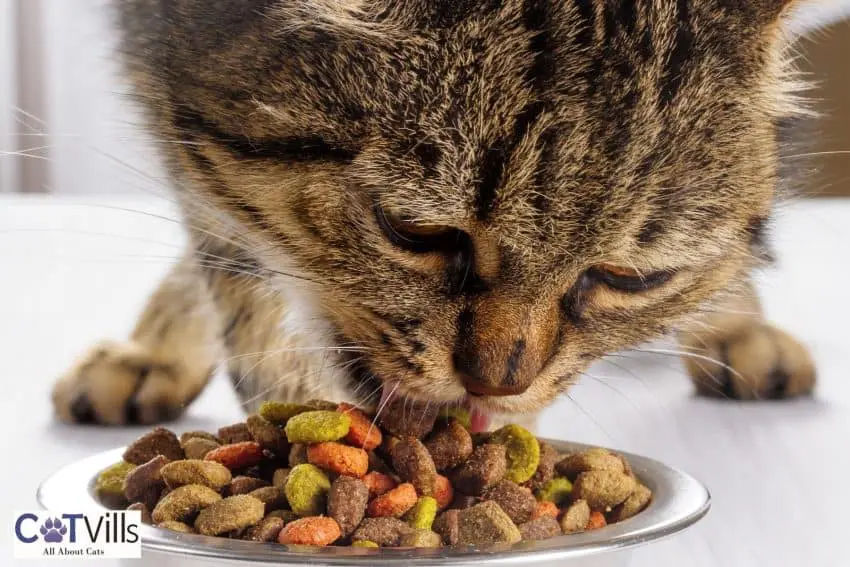
I’ve seen many people yell or use water sprays to keep their cats off tables and counters. However, cats don’t connect you to punishing them with their crime.
Moreover, punishments increase your cat’s anxiety and can trigger aggression, especially if your kitty thinks you’re going to take their meal away.
FAQs
How Many Times Should You Feed a Cat in a Day?
You can feed adult cats twice or thrice a day, depending on your schedule and the cat’s overall condition (underweight, overweight, or normal). On the other hand, you should have food available all the time if you have kittens under six months because they need a lot of calories to grow up healthy.
Is It Normal for a Cat to Want to Eat All the Time?
No, it’s not normal for a cat to want to eat all the time. Usually, constant hunger is a symptom of an underlying medical condition, such as diabetes.
Can Cats Be Addicted to Food?
Yes, cats can get addicted to food and even to the shape of the kibble. Interestingly, cats can also imprint on certain brands, and according to Mikel Delgado, “kitten will show preferences for foods that their moms ate when the kitten was in the womb!”
Conclusion
Food obsession in cats often results from an underlying health problem—a physical or psychological one. And it can turn feeding times or preparing meals into something you dread
Fortunately, you can curb the behavior with some small adjustments in how you feed your cat and help from professional cat behaviorists.
What do you think about this topic? Is your cat obsessed with food, and how do you deal with it? Share your thoughts in the comment section.
References:
